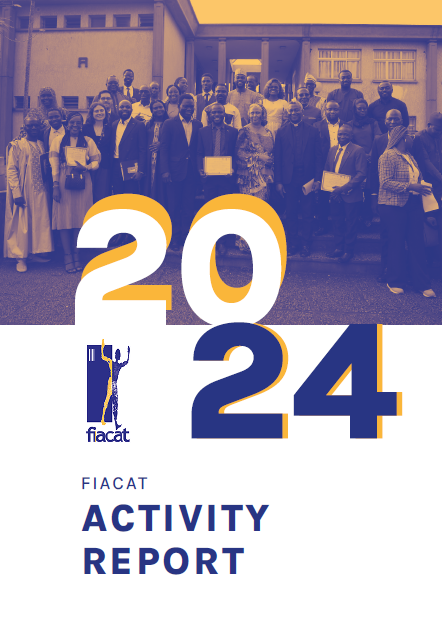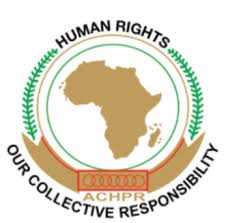African Commission on Human and Peoples' Rights
65th Ordinary Session (21 October to 10 November)
***
Item 8: Progress report by the Chairperson of the Working Group on the Death Penalty and Extrajudicial, Summary or Arbitrary Executions in Africa
Joint Statement by FIACAT, the World Coalition Against the Death Penalty and FIDH
Dear Chairperson,
Honorable Commissioners,
Dear participants,
Dear colleagues,
The fight for the abolition of the death penalty has gained a lot of ground on the African continent. In 2017, Burkina Faso and Guinea abolished the death penalty for all crimes in 2017. In September 2018, the Gambia ratified the Second Optional Protocol to the International Covenant on Civil and Political Rights (ICCPR), which aims to abolish the death penalty. On 2 October 2019, Angola was the most recent country in the world to ratify the same Protocol.
However, much remains to be done regarding the abolitionist struggle in Africa: 18 countries have a de facto moratorium on executions while maintaining death sentences and 16 continue to sentence and execute. The question of the resumption of the use of the death penalty is particularly important in the current context; while several advances have indeed been made towards the abolition of the death penalty, some setbacks must nevertheless be raised.
Madam President,
In Chad, the law on the suppression of acts of terrorism and the death penalty for perpetrators of or accomplices to acts of terrorism has marked a significant step backwards. Indeed, this law retains a very vague definition of terrorism that makes it possible to include all kinds of offences not related to terrorism, as was the case when 4 people were convicted of murder on 27 August 2018.
Nevertheless, the Ministry of Justice of Chad organized a workshop from 4 to 8 February 2019 in Bakara to review the draft law on the suppression of acts of terrorism. The latter is abolitionist in that it uses life imprisonment as the maximum penalty. That is why our organizations call on the Government of Chad to continue its abolitionist momentum by accelerating the process of adopting this draft law in the Council of Ministers and to put it on the agenda for the next parliamentary session.
Madam President,
In Niger, while no death sentences were handed down in 2017 and 2018, the courts of assizes in Zinder (March 2019), Niamey (June 2019) and Tahoua (September 2019) handed down 9 death sentences.
We would like to recall that the supreme law of Niger provides in article 11 that "the human person is sacred[and that the State] has an absolute obligation to respect and protect it" and in article 12 that "everyone has the right to life". In addition, Niger has observed a de facto moratorium on the death penalty since 1976, the date of the last execution. Finally, in December 2018, Niger voted in favor of the UN General Assembly resolution calling for a universal moratorium on the death penalty. That's why our organizations are calling for:
- the Nigerien authorities to enforce the provisions of the Constitution by the courts and to commute these death sentences to prison sentences;
- the ACHPR to remain attentive to the situation of the death penalty in Niger and to make an urgent appeal to the President of the Republic for the resumption of death sentences.
Madam President,
For more than 12 years, Zimbabwe has not carried out any capital executions.
On 22 March 2018, Zimbabwe's President Emmerson Mnangagwa commuted to life imprisonment the sentences of death row inmates who have been awaiting execution for more than 10 years; at least 16 people have benefited from this measure. On the occasion of the 16th World Day against the Death Penalty, the President reaffirmed his opposition to the death penalty. In December 2018, Mr. Ziyambi told the Senate Human Rights Committee that Parliament will debate amendments to the Constitution to end the death penalty in order to keep pace with what is being done elsewhere in the world.
However, in 2018, more than 5 death sentences were recorded, and more than 81 people are still facing death sentences in Zimbabwe. In addition, in December 2018, Zimbabwe voted against the UN General Assembly resolution calling for a universal moratorium on the death penalty, moving from abstention to real opposition.
Considering that the commutation of death sentences is an encouraging first step, our organizations call on:
- the Zimbabwean authorities have accelerated the abolition of the death penalty by amending the Constitution while raising public awareness of the merits of abolition;
- the ACHPR to remain vigilant about persons sentenced to death pending execution.
Madam President,
On 10 October last, we celebrated the 17th World Day against the Death Penalty, which aims to raise awareness of the rights of children whose parents have been sentenced to death or executed.
Often forgotten, these children carry a heavy emotional and psychological burden that can constitute a violation of their human rights. This trauma can occur at any stage of a parent's death sentence: arrest, trial, sentencing, death row suspension, execution dates, execution itself and its consequences. The repeated cycles of hope and disappointment that can accompany all these stages can have a long-term impact, sometimes well after the transition to adulthood.
In accordance with the values set out in the African Charter on the Rights and Welfare of the Child, the best interests of the child must be a primary consideration in the context of judicial matters. On the occasion of the 30th anniversary of the International Convention on the Rights of the Child, on 20 November 2019, we are reminded that the death penalty is a profound violation of children's rights, which are human rights.
Thank you very much.




